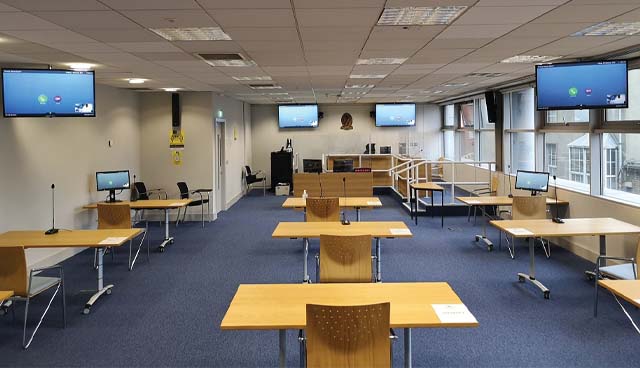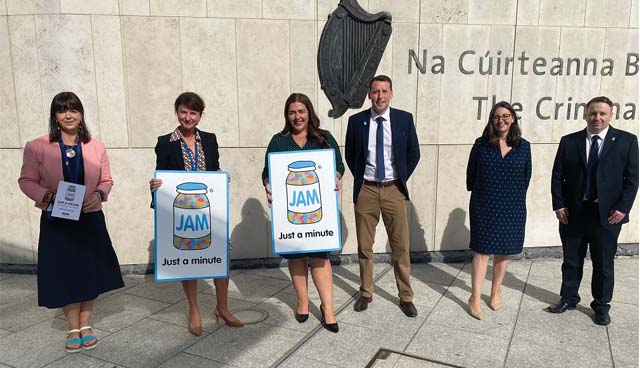Putting people at the centre of a modern and digital Courts Service

Audrey Leonard, Assistant Secretary, Strategy and Reform Directorate, outlines the Courts Service’s plans for the future, the Strategic Vision for the Courts Service to 2030 and the 10-year modernisation programme of activity to deliver on that vision. As Head of the Modernisation Programme she also highlights the objectives of this programme to develop new digital technology and modern ways of working for the administration of justice by placing the user at the centre of how service delivery is designed and delivered. With the ultimate goal of making access to justice easier and quicker to navigate based on user needs.
The Courts Service are currently in the Transition Phase of their Modernisation Programme, which is focused on establishing the foundations for modernisation – building capability and capacity, establishing modern technology platforms, developing organisational strategies and ICT frameworks, and piloting new user-centric models.
The Courts Service is responsible for the management and administration of the Courts in Ireland. The Service has a unique role supporting the third branch of Government and there is a need for the courts to continually embrace change to adapt for the future because of what Uachtarán na hÉireann, Michael D Higgins called “the vital role the courts play in the functioning of the State…they are entrusted with the task of upholding the Constitution…the decisions of the Courts affect the personal lives of individuals and the world of business… as society continues to evolve, it places many demands on our institutions including our legal structures; therefore, they must continue to adapt so that they can meet the needs of society and citizens”.
In reflecting back on the experience of the Courts over the past 18 months Leonard is reminded of the recently retired Chief Justice Frank Clarke’s words when he described the pandemic as “the catalyst none of us wanted but Covid-19 had the modernising effect on our courts system that was needed”.
Since the beginning of the pandemic the Courts Service has facilitated approximately 6,068 remote court sessions. In 2020 the Courts Service facilitated 13,326 video links to Irish prisons, a significant increase from 3,798 in 2019, which supported the sector wide effort to minimise the incidence of Covid-19 in prisons. At a recent meeting of the Joint Oireachtas Committee on Justice, VSAC (Victim Support at Court) confirmed that measures taken in Courts during the pandemic such as the staggering of lists, meant less time waiting around to give evidence and less crowded court spaces, plus the option to provide evidence remotely had positively impacted on the experience of their clients. They particularly noted how these measures had reduced the anxiety of their clients.
Leonard notes: “Much of what has been achieved in the past 18 months was in planning under modernisation for the next five to 10 years; the constraints imposed by the pandemic and the creativity, dedication and determination of our people accelerated those plans. We are now challenged to ensure we take the best of what we have experienced during the pandemic forward to fulfil our vision for 2030 of a more human centred, digital first courts system in collaboration with the judiciary and our justice partners across the sector.”
Scale of change
Reflecting on the scale of the change experienced Leonard says: “Very few areas of our business have gone unchanged since the pandemic, we were one of the few frontline services that stayed open throughout, a service that was based on facilitating volumes of numbers of people through our Courts and court offices at any one time. The lengths our colleagues on the frontline have gone to can’t be underplayed. Some of the changes which have placed an extra burden on colleagues won’t remain however those that have improved our service will.”

“When you’re introducing change of this scale, momentum is really important as is dedication from staff to innovate and improve the way we work. One of the best lessons we have learnt from the pandemic is the ability within the organisation to innovate.”
Some of those changes since the pandemic, include rolling out nationwide a system to lodge licensing applications online; eLicensing, reducing the requirement for solicitors, members of the public and Gardaí to attend Court. A pilot Online Appointments system has been trialled in three locations; the Central Office of the High Court, District Court Family Law in Dolphin House, and Limerick Court Office allowing for scheduling of appointments and reducing time waiting on court premises A civil reform programme has been established and is already developing an agile approach to exploring and adopting the recommendations in the Administration of Civil Justice: Review Group Report (Kelly Report). A family law reform programme has also been established to take a more human-centred approach to ensure better outcomes for court users and their families. The criminal law and organisational reform programmes complete the four programmes established under modernisation which aim to work in an agile way, with stakeholders to develop more user centric practices, communications, systems, and spaces for now and into the future.
Innovation and user-centred services
Talking about modernising into the future, Leonard explains: “When you’re introducing change of this scale, momentum is really important as is dedication from staff to innovate and improve the way we work. One of the best lessons we have learnt from the pandemic is the ability within the organisation to innovate. Even when staff were working to capacity, they were still thinking of ways to improve our service. The Courts Service last month became the first civil service organisation in the Republic to become JAM Card friendly with 75 per cent of colleagues having undertaken the training, an initiative which was initially proposed by colleagues through our innovation programme.”
A JAM Card allows people with a learning difficulty, autism, or a communication barrier to tell others that they need ‘just a minute’ discreetly and easily in a simple, effective non-verbal manner. The Courts Service has introduced this to improve customer service for people that may need just a minute at public counters. “We are very aware that often people attend at Court or court offices at some of the most difficult times in their life. We want to be able to communicate in an appropriate and supportive way, while also giving our colleagues the tools and skills to be able to deal with working in an often-traumatic environment. Again, initiated by colleagues, a trauma informed practice training programme is now being introduced to the organisation,” explains Leonard.
Confirming that people are the key to successful modernisation Leonard explains: “We can’t look to our people to make this scale of change possible without having the right supports for them. The Senior Management Team are dedicated to supporting good ideas coming through from teams on the ground. The SMT supported the Covid-19 team’s proposal to digitise the daily compliance checks required as part of our C19 Safety Management Programme, being completed by our amazing worker representatives to support safe delivery of services across 103 venues. This initiative approach introduced and implemented during a very disruptive time has resulted in the Courts Service being short-listed in the ‘Leading Reform in Covid-19’ category of the Civil Service Excellence and Innovation Awards 2021.”
Our people, our strength
With approximately 1,100 staff working across a wide range of venues including court rooms, court offices and public and support offices over 26 counties, the Courts Service give many staff the opportunity to have a career in a location that suits them. “In addition to the benefits available in the civil service such as flexible working arrangements including shorter working year, parental leave, career break, study and exam leave and work sharing, the Courts Service offers a broad range of roles which can provide diverse and interesting career options. For example, roles such as Court Registrar, General Solicitor, Court Office Manager, as well as support office roles in accounting, finance, ICT, human resources, policy, strategy and communications. Our Judicial Assistant programme attracts many legal graduates looking to gain further knowledge of the legal system. Our internal mobility policy gives staff the opportunity to steer their career into an area that interests them, and where they feel they can add value.”
Learning and development is particularly strong in the Courts Service, staff have benefitted from 624 staff training days delivered so far in 2021 with all training moving to online/blended learning platforms this year. The L&D team supported the Covid-19 safety management team by developing videos and modules which helped staff and court users understand the Covid-19 measures in place which kept courts open and safe during the pandemic.

“Our ambitious vision for the future and modernisation plans make this a dynamic time to work in the Courts Service. Our people are key to achieving those goals and we in turn need to help our people reach their goals. For that reason, we take a coaching approach to management, we are embedding a culture of innovation in the organisation with our innovation strategy, network and advocates and we have introduced a ‘developing your career pathway’ programme starting with Clerical Officer and Executive Officer grades.”
Continuing to look to the future Leonard concludes by summarising: “The future is bright, the pandemic has taught us that our highly traditional legacy sector can change, and for the better. Much has been done to put in place the foundations for real change but the longer-term strategic reform and change programmes require a more ongoing considered approach and that will take time. Equally we want to continue to deliver visible change in the shorter term so, there will be projects that will be progressed more quickly. Our challenge now is to empower our colleagues to adopt the positive changes for the long term, to improve the way they work with better technology and resources. This is our opportunity to positively build on what has been achieved to date, to provide easier, quicker and more efficient access to justice for all involved.”
T: 01 888 6000
E: communications@courts.ie
W: www.courts.ie






